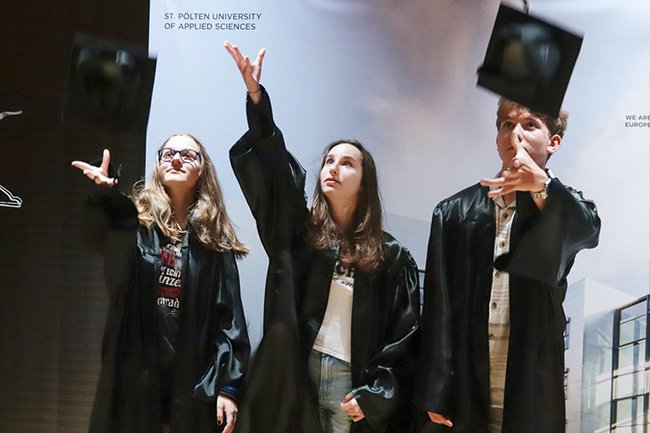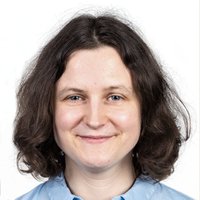How Much Does the World Cost?
Young Campus 2024 – Record Participant Numbers at the St. Pölten UAS’ Youth University

From film and advertising design to programming and health: almost 60 young people between 14 and 20 years could realise their creative ideas at the St. Pölten UAS and delve into the higher education sphere last week.
Producing your own film, making colourful cooking experiments, or programming a computer game – the 60 young people at the St. Pölten UAS’ Young Campus had no time for boredom. In four workshops and under the guidance of UAS experts, the young people could get acquainted with the UAS and contemplate on the common framework theme of “Was kostet die Welt?“ revolving around money and costs during their workshop projects. “At Campus St. Pölten, the young people could have a first-hand experience of the atmosphere at a modern university,” says Gabriele Permoser, head of the UAS Service and Competence Center for Research and Cooperation who rejoiced at the high participant numbers: “We are happy that more young people than ever before joined this year’s Young Campus. It’s great to see the exciting projects they have implemented.”
“Was kostet die Welt?” – Spotlight on Money and Costs
The week was dedicated to the topic of money and costs. The theme was the Austrian saying “Was kostet die Welt?”, which roughly translates into “How Much Does the World Cost?” – a humorous way of expressing (one’s own) willingness to spend money on something. The project ranged from a filming approach to debts and the status of money in society in general and the development of computer games where players earn money in a playful way and can train how to spend money wisely, to a comparison of the quality of discounter and brand products when it comes to diet and healthy but affordable cooking.
Young Campus Attracts Young People from All over Lower Austria
Each year, many young people are excited to join the Young Campus. Even a longer journey did not deter them from coming this year. “It’s great fun! There is a relaxed atmosphere. We learn a lot of new things, even though we already occasionally know one or the other thing. We can definitely recommend the Young Campus”, say Lissi and Larissa. Both of them especially travelled from the district of Mistelbach and organised an accommodation in St. Pölten during the Young Campus. “I learned about the Young Campus on the Bachelor.Day. I am considering studying at the UAS next year. This is why I thought this is a nice opportunity to get to know everything”, says Lissi who asked her friend Larissa to join her. While Lissi participated in a film project, Larissa, who goes to a school with a technology focus, developed a computer game with her group.
Ashley who starts an apprenticeship leading up to a school-leaving certificate (“Lehre mit Matura”) also shows great enthusiasm for the summer university. “At first, we worked on a storyboard for our film, and they gave us a lot of advice how to do this. And then, we shot the scenes and did the cutting. We have learned much from each other.”
Diversity As the Key to Success: Experiences and Learning at the Young Campus
The young people could not only learn new things from the UAS experts, the diverse group also benefited from the various backgrounds and educational paths of each individual participant. “Diversity is an important contributor to the success of a group. It brings new ideas, helps in decision making, and promotes understanding for one another. The different perspectives make us stronger, more creative and better at adapting to changing circumstances. This is why we want to express our heartfelt thanks to our cooperation partners in the field of youth work who recommended our Young Campus so enthusiastically”, says Angelika Czedik-Eysenberg, project lead of the Young Campus.
“Knowledge transfer und exchange with society play an important role at the St. Pölten UAS. The Young Campus offers optimal opportunities to this end“, says Permoser.
About Young Campus
The Young Campus is the St. Pölten UAS‘ youth university for everybody from 14 to 20 years. During the workshop days in summer, the young people may try out new topics and implement their own project within the framework theme using the techniques they have just learned.
The Young Campus is supported by the Federal Ministry of Education, Science and Research, by the OeAD – Austria’s Agency for Education and Internationalisation, GRAWE – Grazer Wechselseitige Versicherung AG, UpNano, Dorothea Heiss: Consulting für Scale-Ups, Rotary Club St. Pölten, Fahrschule Sauer, and Sparkasse Niederösterreich Mitte West.
Further information on Young Campus and videos on the workshops can be found at Website as well as on Instagram and TikTok.

Mag. Dr. Angelika Czedik-Eysenberg
Science Communication and Public EngagementResearch and Knowledge Transfer Center for Research and Cooperation